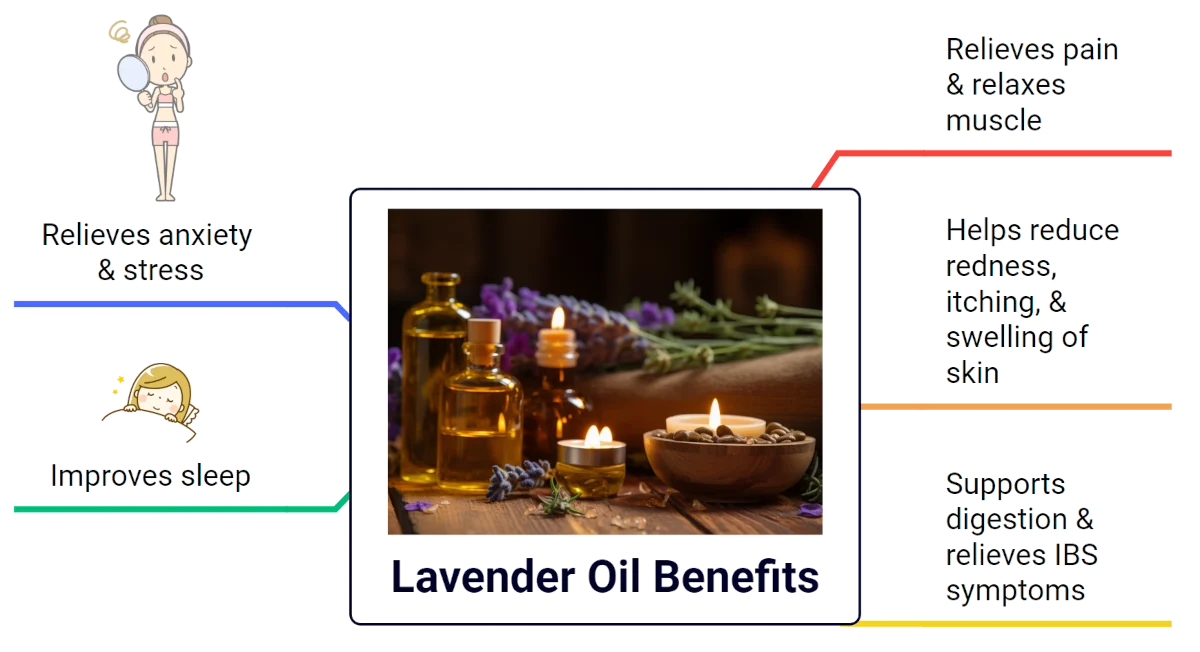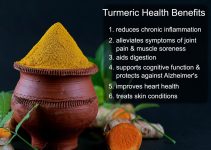
Table of Contents

Lavender (Lavandula angustifolia) is a fragrant flowering plant native to the Mediterranean region, widely recognized for its calming aroma and therapeutic properties. For centuries, it has been used in traditional medicine, aromatherapy, and cosmetics. Today, lavender essential oil—extracted from its flowers—is the most common form used for health and wellness purposes.
5 Lavender Oil Benefits for Better Health
1. Anxiety and stress relief through lavender aromatherapy
Lavender oil is well-known for its anxiolytic (anxiety-reducing) effects.
Lavender aromatherapy is one of the most popular natural methods for promoting relaxation and emotional well-being. Aromatherapy involving the inhalation of lavender essential oil has been shown in multiple studies to ease anxiety, stress, and restlessness. Inhaling the soothing scent of lavender essential oil can calm the nervous system, lower heart rate, and reduce stress hormones.
Studies (Kadarag, et al. 2017; Yoo & Park, 2023) suggest that lavender aromatherapy may improve mood, ease mild anxiety, and enhance sleep quality, making it a safe and gentle option for holistic wellness. Its calming scent helps relax the nervous system, making it a popular natural remedy for people experiencing mild to moderate anxiety or situational stress.
Many people use lavender through lavender essential oil diffusers, inhalers, or bath blends to create a peaceful environment at home or in the workplace.
2. Sleep Improvement
Lavender is often used as a natural sleep aid. Its soothing fragrance promotes relaxation and enhances sleep quality.
Research indicates that inhaling lavender essential oil before bedtime may help improve overall sleep quality by increasing total sleep time and reducing insomnia symptoms (Lillehei et al., 2015). This effect is largely attributed to lavender’s ability to calm the nervous system and promote the production of relaxing brain waves.
Many people use lavender in aromatherapy diffusers, allowing the scent to disperse throughout the bedroom for continuous inhalation during sleep. Others prefer lavender pillow sprays, which lightly coat bedding with its soothing fragrance, or sachet bags filled with dried lavender flowers, placed near the pillow to provide a gentle, natural aroma.
These methods work by creating a calming environment that helps the body unwind, signaling to the brain that it is time to rest.
3. Pain Relief and Muscle Relaxation
Topical application of lavender oil can help relieve headaches, muscle soreness, joint pain, and menstrual cramps. Its anti-inflammatory and analgesic properties make it effective in reducing discomfort. Lavender oil is frequently used in massage therapy—blended with carrier oils—to relax tense muscles and ease inflammation.
4. Benefits of lavender oil for skin
Lavender has antimicrobial and anti-inflammatory effects, making it useful for minor skin conditions such as acne, insect bites, burns, and eczema. It helps reduce redness, itching, and swelling while promoting wound healing. For this reason, lavender oil is commonly added to skincare products.
5. Digestive Support
Traditionally, lavender has been used to alleviate digestive issues such as indigestion, bloating, and gas. While more scientific research is needed, some herbal formulations include lavender to promote gastrointestinal comfort.
Traditionally, lavender has been consumed in the form of herbal teas or infusions to ease digestive problems such as indigestion, bloating, and gas. Drinking lavender tea may help relax the smooth muscles of the digestive tract, reducing spasms that cause discomfort. Some cultures also used lavender tinctures or extracts in small amounts as part of herbal remedies for gastrointestinal relief.
In modern practice, lavender essential oil is sometimes available in capsule form (such as enteric-coated preparations) to support digestion and relieve symptoms of irritable bowel syndrome (IBS).
However, direct ingestion of pure lavender oil is not recommended unless guided by a healthcare professional, as essential oils are highly concentrated.
More clinical research is needed, but early findings (Baker et al., 2012; Wang et al., 2021) suggest lavender may have mild carminative (gas-reducing) and antispasmodic properties that contribute to gastrointestinal comfort.
Adverse Reactions and Precautions
Lavender oil is generally safe when used appropriately. However, some individuals may experience allergic skin reactions or mild nausea when using lavender oil. Pregnant and breastfeeding women, as well as individuals taking sedatives, should consult a healthcare professional before using lavender products.
References
Baker, J., Brown, K., Rajendiran, E., Yip, A., DeCoffe, D., Dai, C., … & Gibson, D. L. (2012). Medicinal lavender modulates the enteric microbiota to protect against Citrobacter rodentium-induced colitis. American Journal of Physiology-Gastrointestinal and Liver Physiology.
Karadag, E., Samancioglu, S., Ozden, D., & Bakir, E. (2017). Effects of aromatherapy on sleep quality and anxiety of patients. Nursing in Critical Care, 22(2), 105-112.
Lillehei, A. S., Halcón, L. L., Savik, K., & Reis, R. (2015). Effect of inhaled lavender and sleep hygiene on self-reported sleep issues: a randomized controlled trial. The Journal of Alternative and Complementary Medicine, 21(7), 430-438.
Wang, Y., Zou, J., Jia, Y., Zhang, X., Wang, C., Shi, Y., … & Wang, F. (2021). The mechanism of lavender essential oil in the treatment of acute colitis based on “quantity–effect” weight coefficient network pharmacology. Frontiers in Pharmacology, 12, 644140.
Yoo, O., & Park, S. (2023, January). Anxiety-reducing effects of lavender essential oil inhalation: a systematic review. In Healthcare (Vol. 11, No. 22, p. 2978). Multidisciplinary Digital Publishing Institute.
FAQ
1. What is lavender oil and where does it come from?
Lavender oil is an essential oil extracted from the flowers of lavender (most commonly Lavandula angustifolia). It is produced by steam distillation of the dried or fresh flowers and is widely used in aromatherapy, cosmetics, and traditional herbal medicine.
2. What are the main health benefits of lavender oil?
Commonly reported benefits include reduced anxiety and stress, improved sleep quality, pain relief and muscle relaxation, skin-soothing and antimicrobial effects, and—traditionally—support for mild digestive complaints. Clinical and preclinical studies support many of these uses.
3. How is lavender oil used to reduce anxiety and stress?
Lavender is most often used via inhalation (diffuser, inhaler, or a few drops on a tissue) or in diluted topical blends. Inhalation is thought to calm the nervous system and lower stress hormones; several clinical trials and systematic reviews report modest anxiety-reducing effects.
4. How can I use lavender for better sleep?
Popular methods include using an aromatherapy diffuser in the bedroom, spritzing a pillow spray with diluted lavender oil, or placing sachets of dried lavender near the pillow. Research suggests inhaling lavender before bed can increase total sleep time and improve perceived sleep quality.
5. Can lavender oil help with pain and muscle soreness?
Topical application of diluted lavender oil (blended with a carrier oil) is commonly used in massage to relieve headaches, sore muscles, and joint discomfort. Lavender has mild anti-inflammatory and analgesic properties that may contribute to relief when applied appropriately.
6. Is lavender oil safe for skin? How should I use it?
Lavender has antimicrobial and anti-inflammatory qualities and is used in skincare for acne, minor burns, insect bites, and irritation. Always perform a patch test first and dilute essential oil (typically 1–3% in a carrier oil for topical use). If irritation occurs, discontinue use.
7. Can lavender help with digestive problems or IBS?
Traditionally, lavender tea or tinctures have been used for indigestion, bloating, and gas. Some modern preparations (enteric-coated capsules containing lavender oil) are marketed for IBS symptoms, but high-quality human trials are limited. Preclinical studies show anti-inflammatory and antispasmodic effects that could explain traditional use.
8. Are there side effects or precautions I should know about?
Lavender is generally well tolerated, but possible reactions include allergic skin irritation and mild gastrointestinal upset if ingested. Lavender can increase drowsiness — avoid driving or operating heavy machinery after use. Pregnant or breastfeeding women, children, and people taking sedatives or certain medications should consult a healthcare professional before use.
9. Can I ingest lavender essential oil?
Pure essential oils are highly concentrated. Internal use of lavender oil is not recommended without supervision from a qualified healthcare provider or a licensed aromatherapist. Safer traditional options for ingestion include diluted lavender tea made from culinary lavender flowers.
10. How do I choose and store a quality lavender oil?
Choose 100% pure lavender essential oil (no synthetic fragrances), ideally labeled with botanical name (Lavandula angustifolia), country of origin, and extraction method. Store oils in dark glass bottles, tightly sealed, away from heat and direct sunlight to preserve potency.



